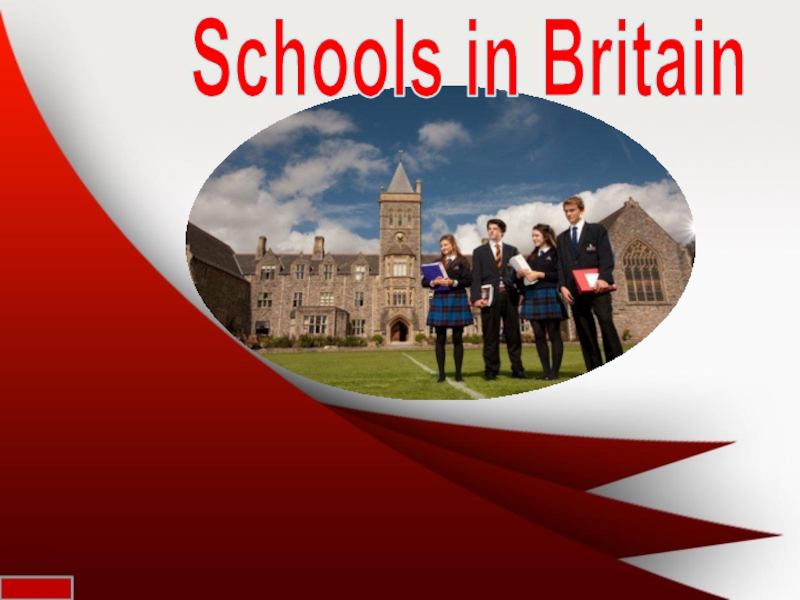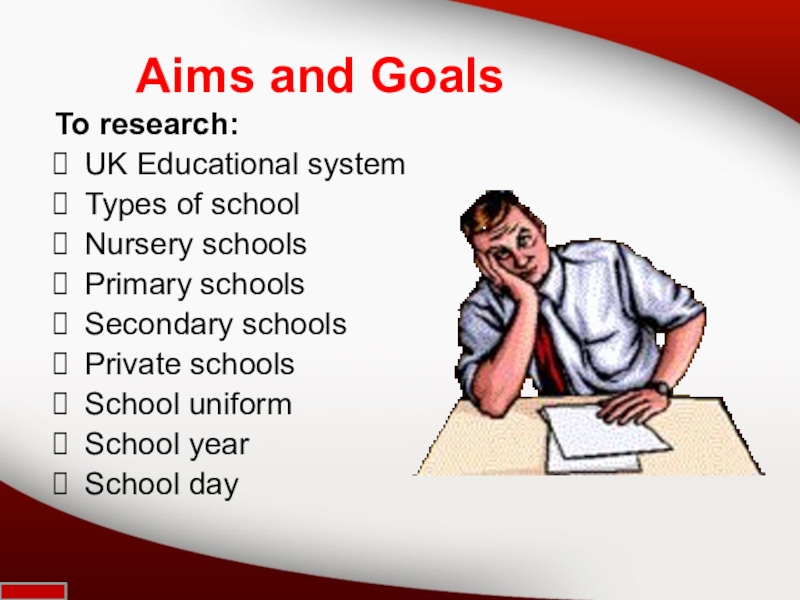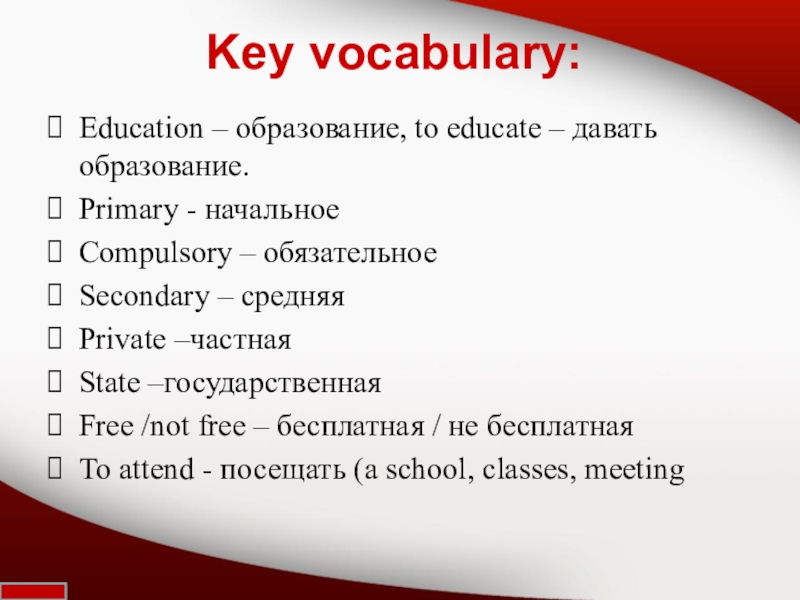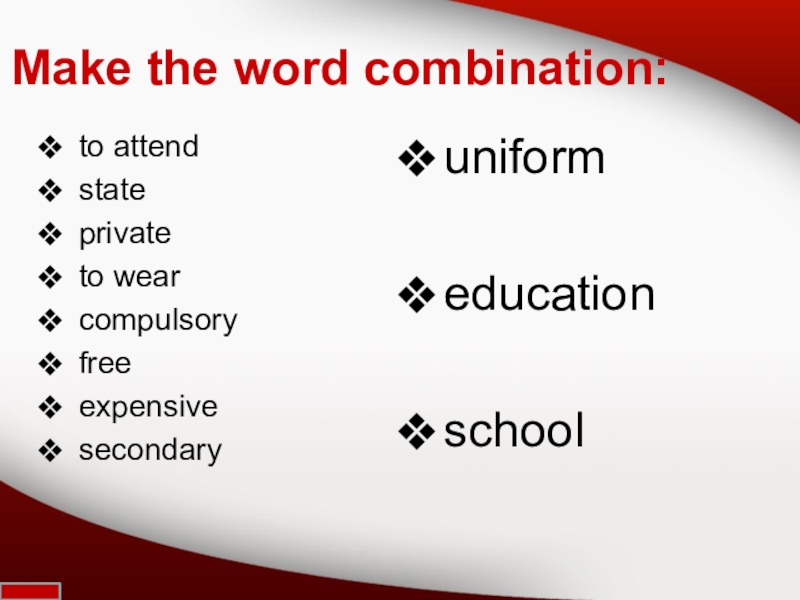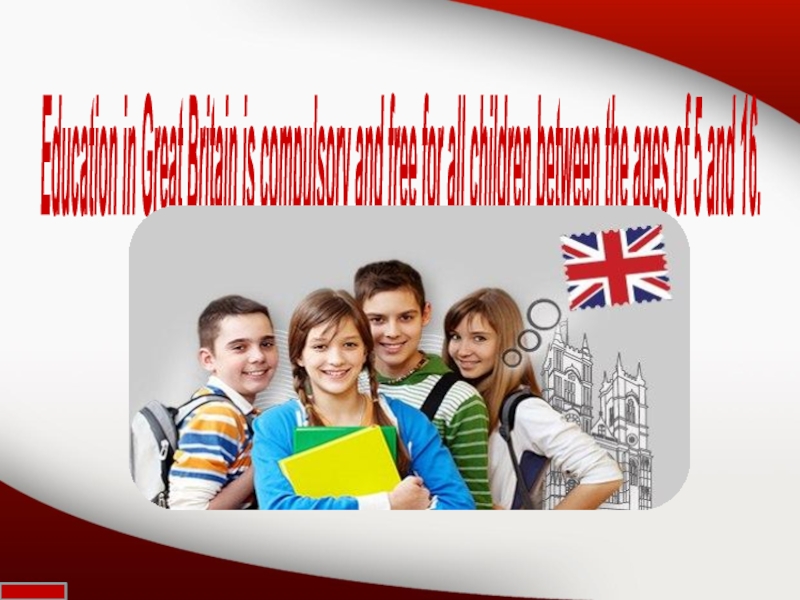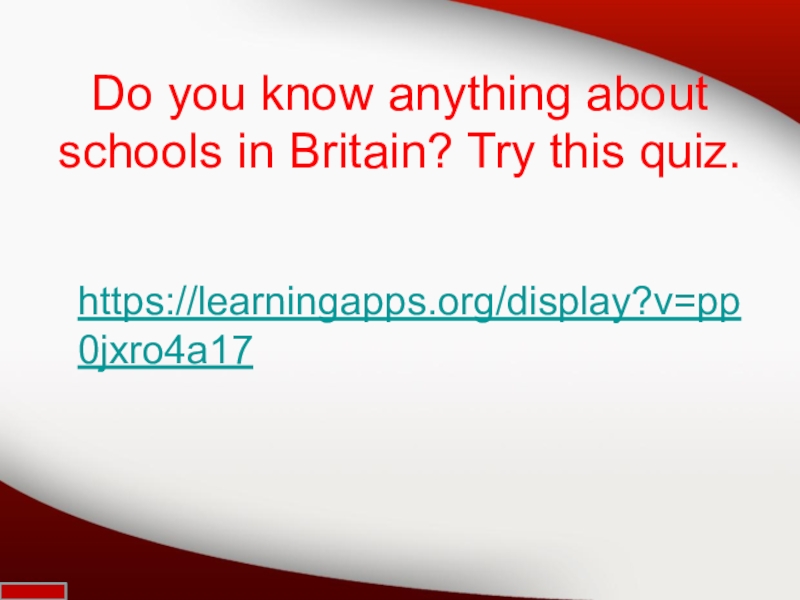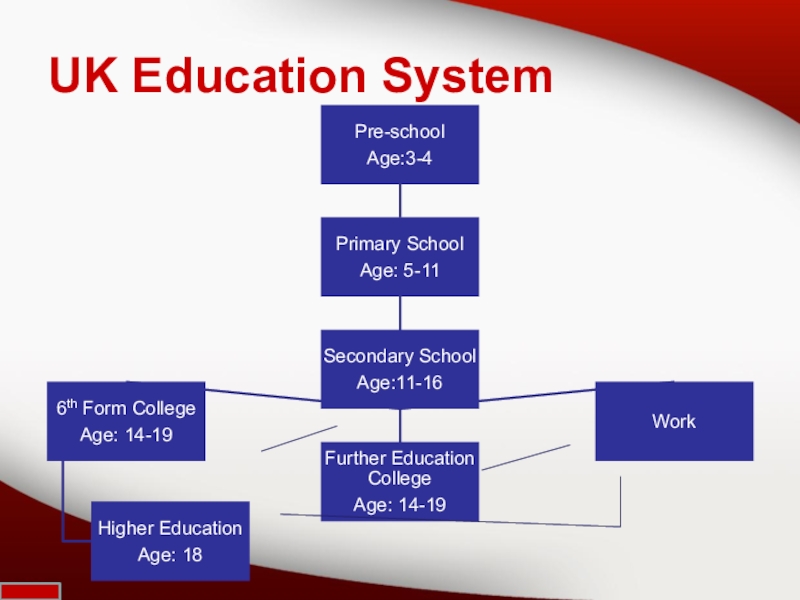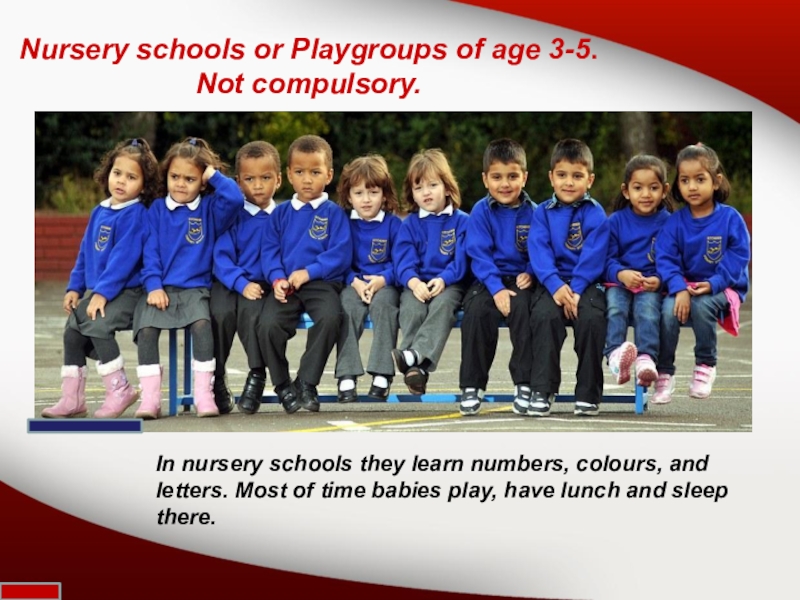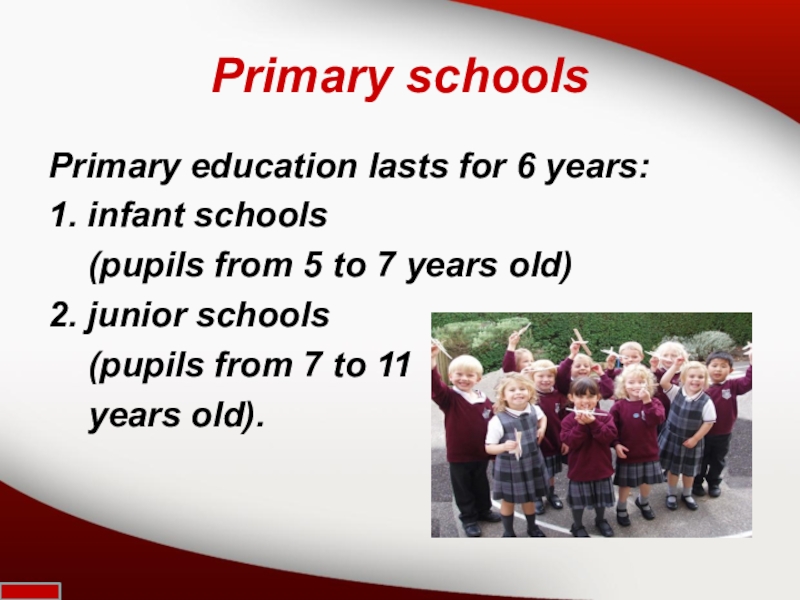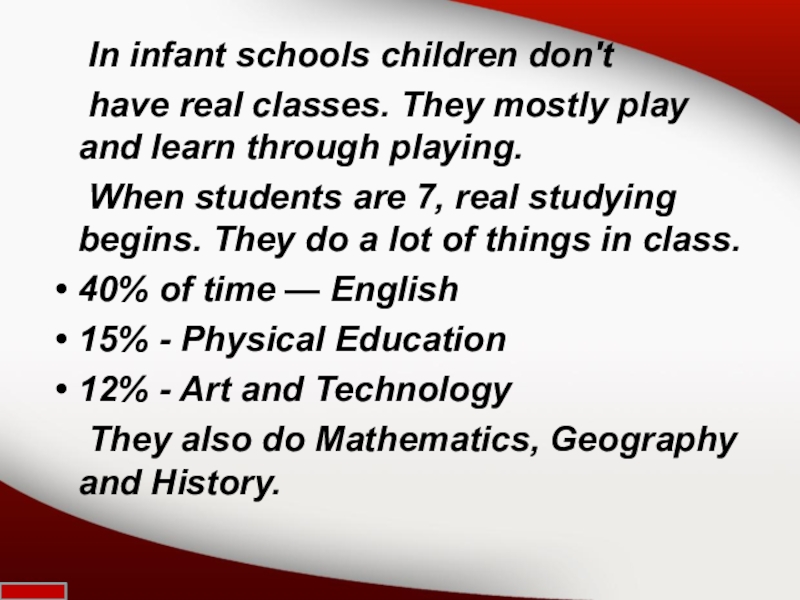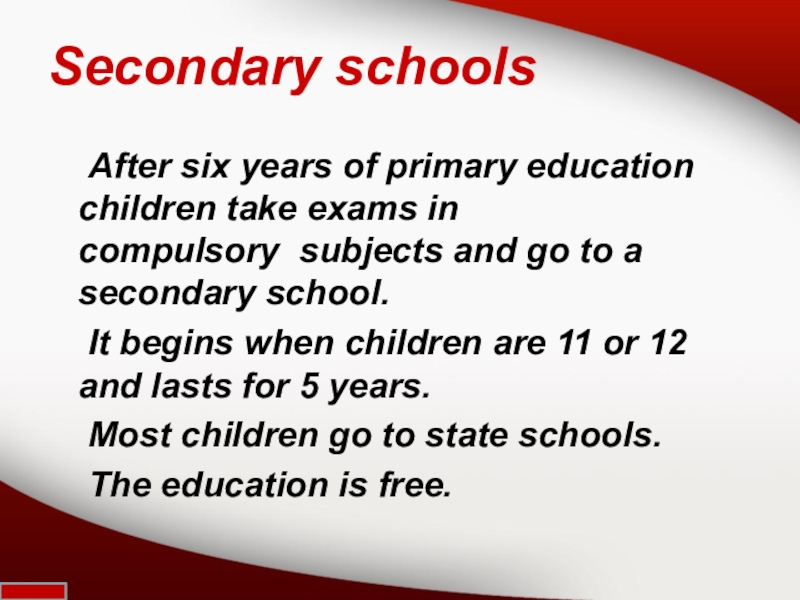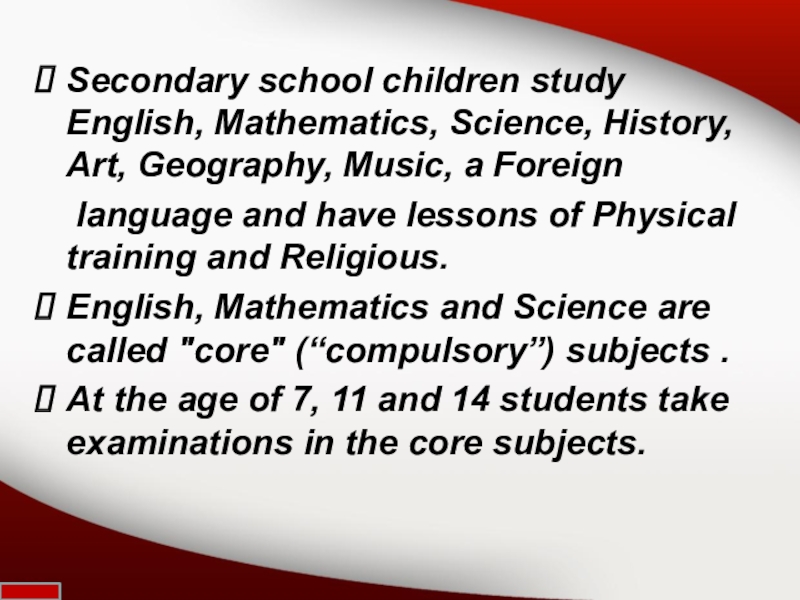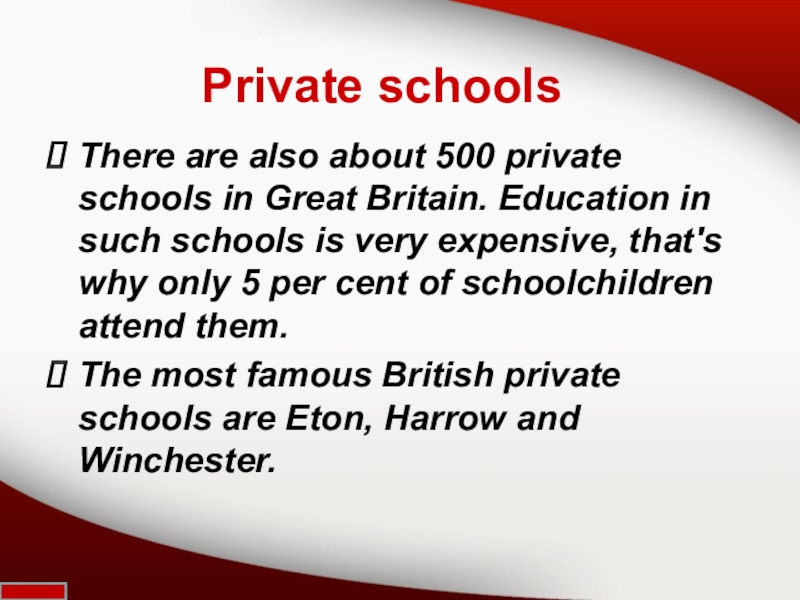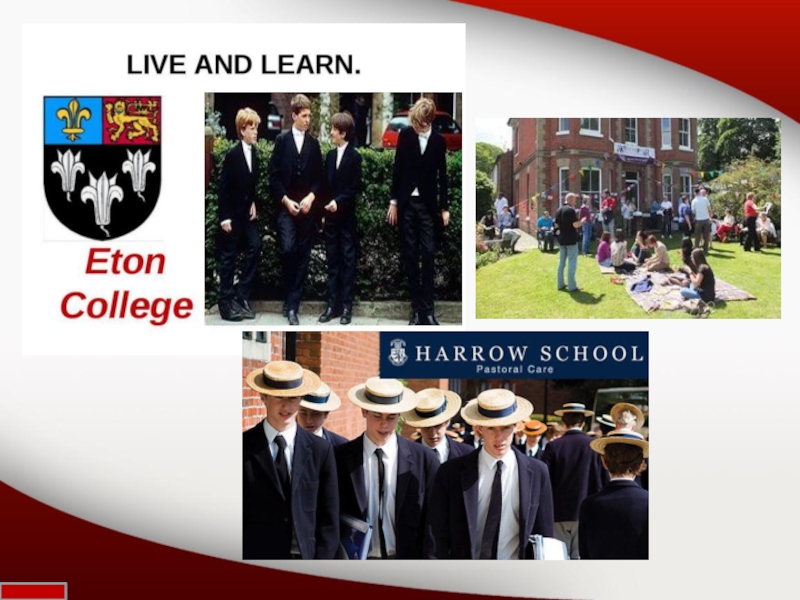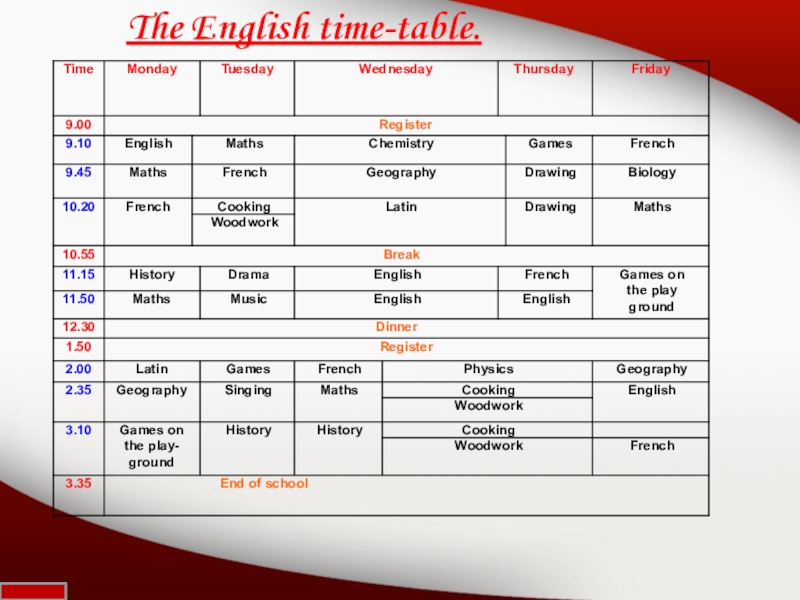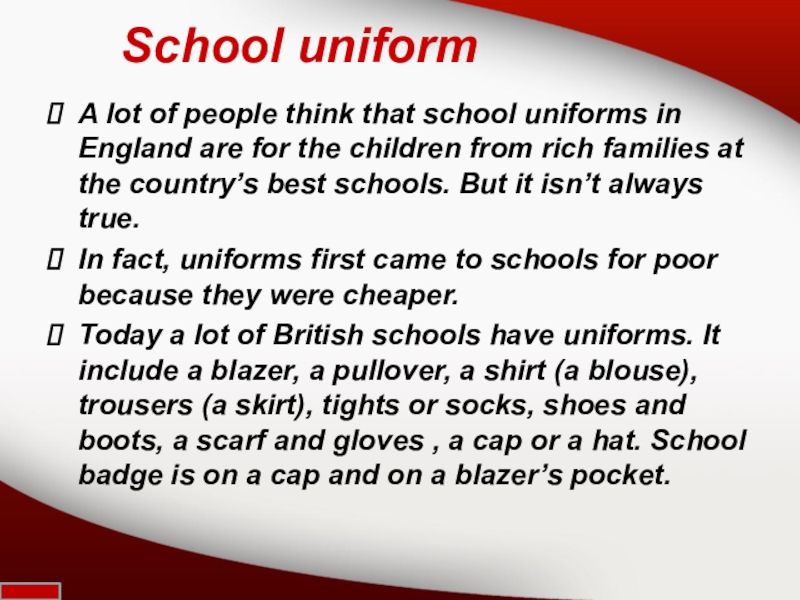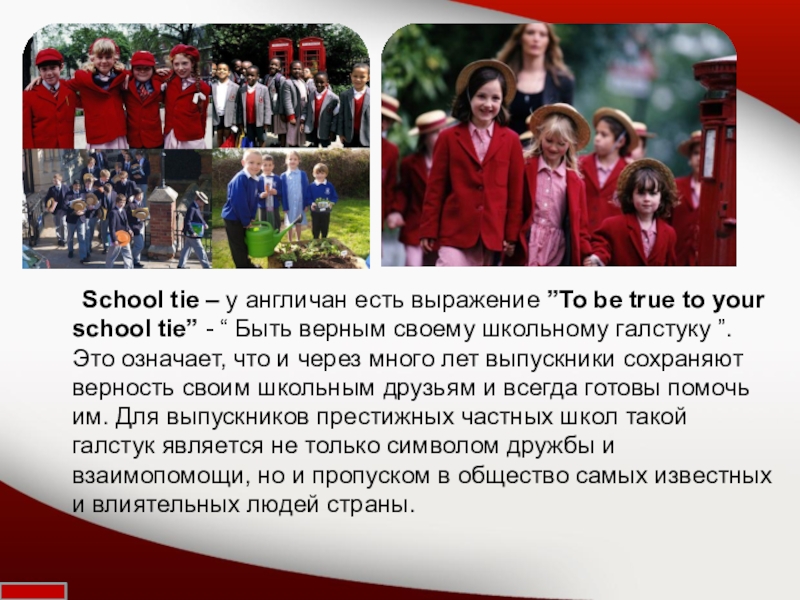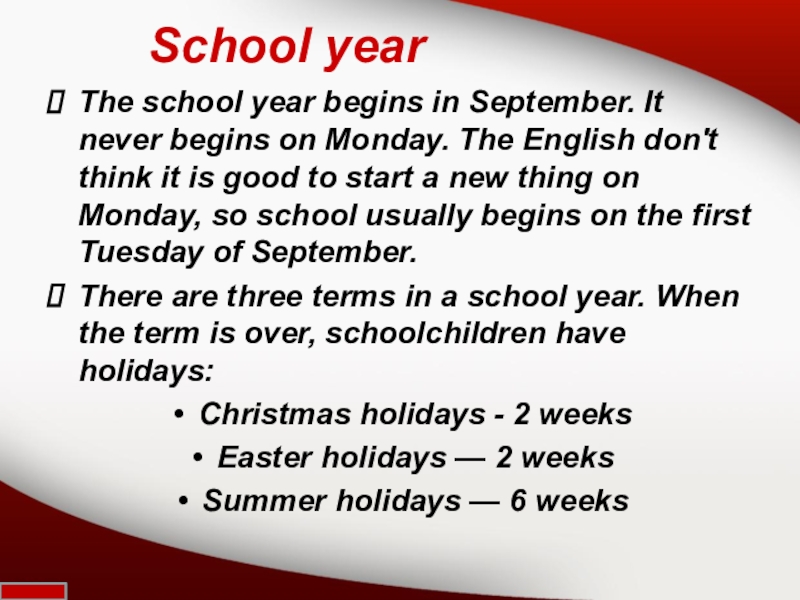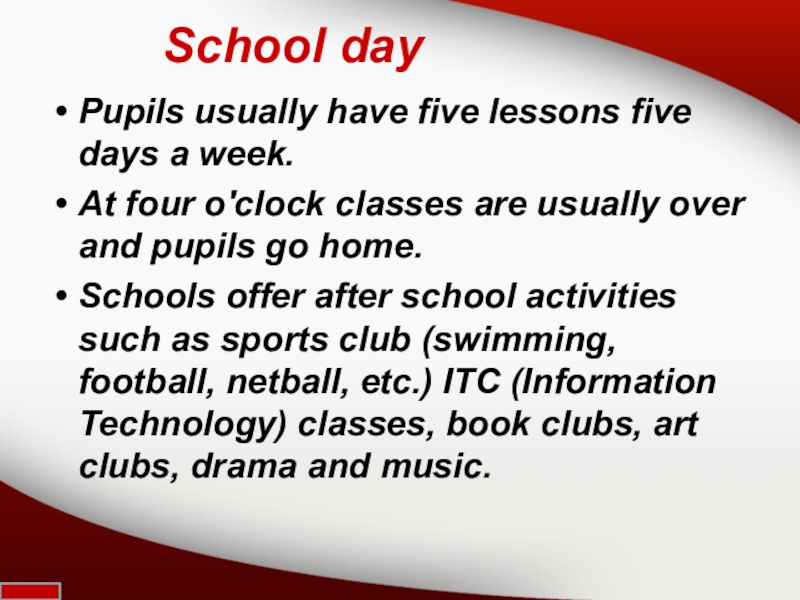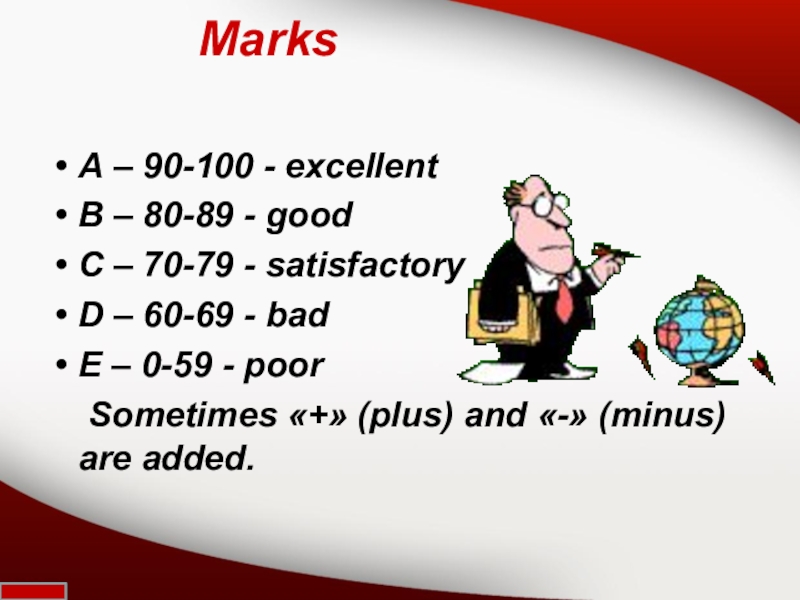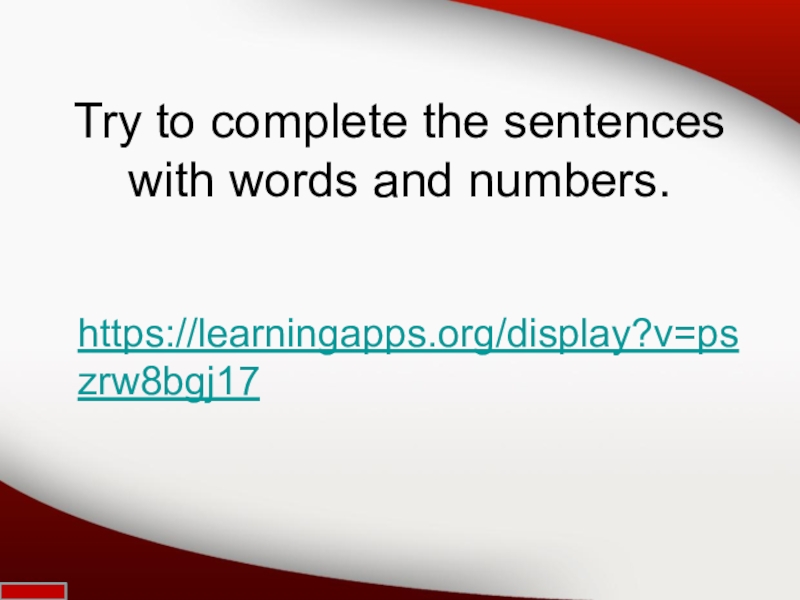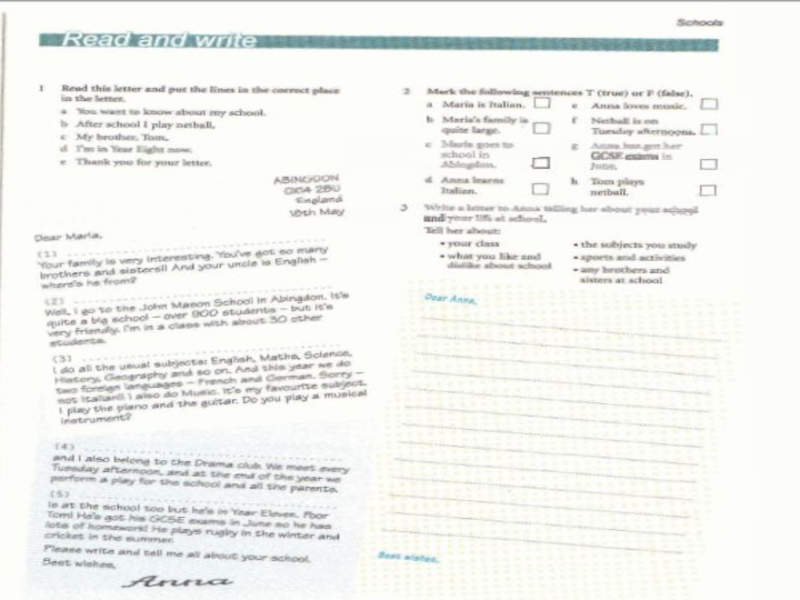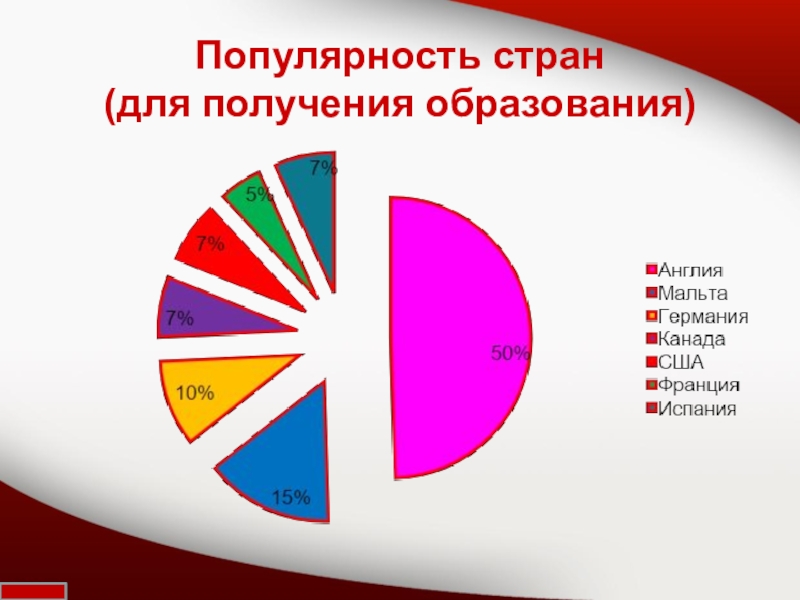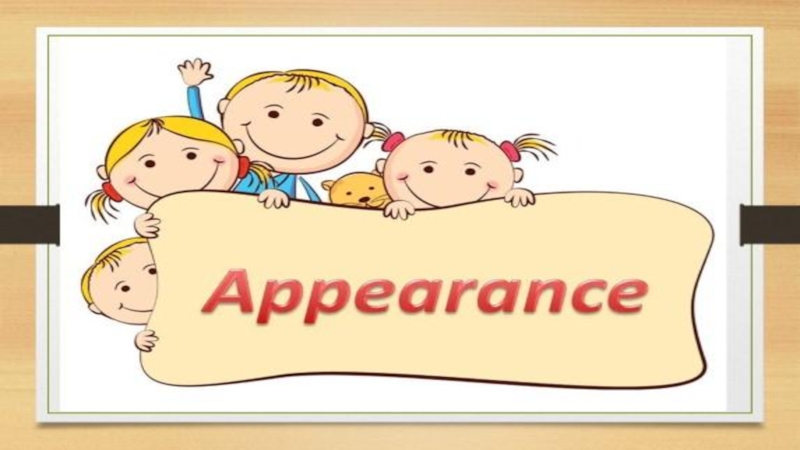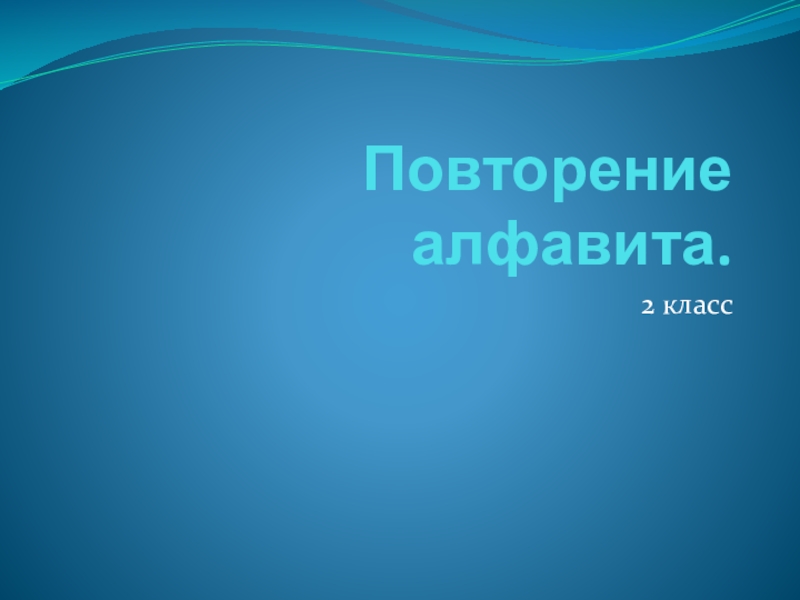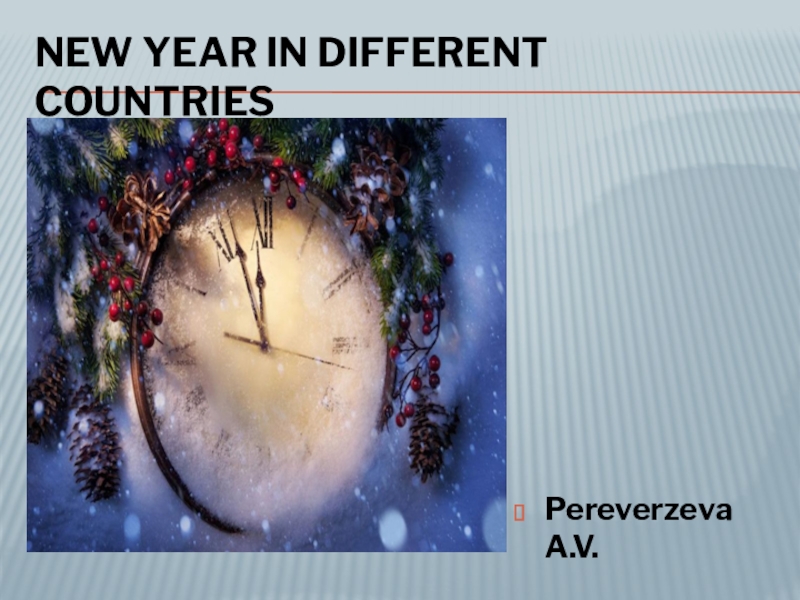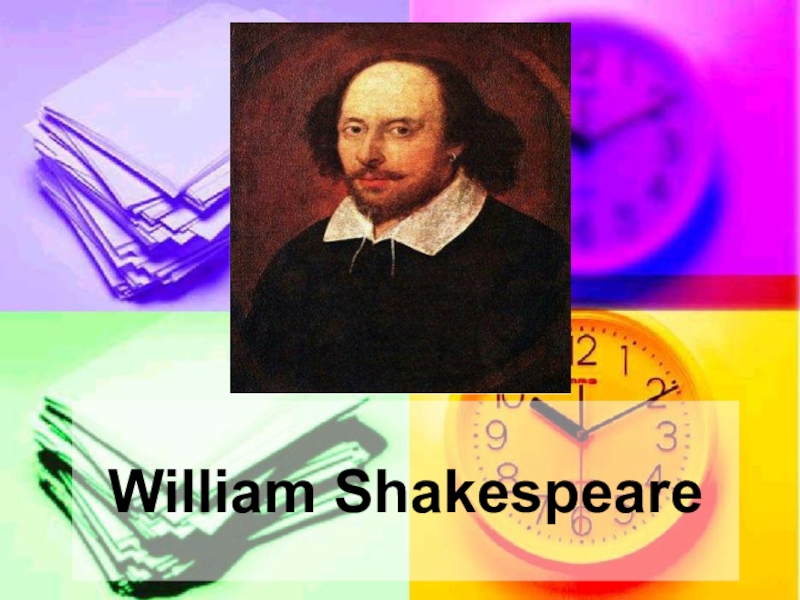- Главная
- Разное
- Образование
- Спорт
- Естествознание
- Природоведение
- Религиоведение
- Французский язык
- Черчение
- Английский язык
- Астрономия
- Алгебра
- Биология
- География
- Геометрия
- Детские презентации
- Информатика
- История
- Литература
- Математика
- Музыка
- МХК
- Немецкий язык
- ОБЖ
- Обществознание
- Окружающий мир
- Педагогика
- Русский язык
- Технология
- Физика
- Философия
- Химия
- Шаблоны, фоны, картинки для презентаций
- Экология
- Экономика
Презентация, доклад на тему Система образования в Великобритании.
Содержание
- 1. Система образования в Великобритании.
- 2. Aims and GoalsTo research:UK Educational systemTypes of schoolNursery schoolsPrimary schoolsSecondary schoolsPrivate schoolsSchool uniformSchool yearSchool day
- 3. Key vocabulary:Education – образование, to educate –
- 4. Make the word combination:to attendstateprivateto wearcompulsoryfreeexpensivesecondaryuniformeducationschool
- 5. Education in Great Britain is compulsory and
- 6. Do you know anything about schools in Britain? Try this quiz. https://learningapps.org/display?v=pp0jxro4a17
- 7. Слайд 7
- 8. UK Education System
- 9. Nursery schools or Playgroups of age 3-5.
- 10. Primary schoolsPrimary education lasts for 6 years:1.
- 11. In infant schools children don't have real classes.
- 12. Secondary schools After six years of
- 13. Secondary school children study English, Mathematics, Science,
- 14. Private schoolsThere are also about 500 private schools in
- 15. Слайд 15
- 16. Слайд 16
- 17. School uniform A lot of people think
- 18. School tie – у англичан есть выражение ”To be true
- 19. School year The school year begins in
- 20. School day Pupils usually have five lessons
- 21. Marks A – 90-100 - excellentB – 80-89 - goodC – 70-79 -
- 22. Try to complete the sentences with words and numbers. https://learningapps.org/display?v=pszrw8bgj17
- 23. Слайд 23
- 24. Популярность стран (для получения образования)
Aims and GoalsTo research:UK Educational systemTypes of schoolNursery schoolsPrimary schoolsSecondary schoolsPrivate schoolsSchool uniformSchool yearSchool day
Слайд 2Aims and Goals
To research:
UK Educational system
Types of school
Nursery schools
Primary schools
Secondary schools
Private
schools
School uniform
School year
School day
School uniform
School year
School day
Слайд 3Key vocabulary:
Education – образование, to educate – давать образование.
Primary - начальное
Compulsory
– обязательное
Secondary – средняя
Private –частная
State –государственная
Free /not free – бесплатная / не бесплатная
To attend - посещать (a school, classes, meeting
Secondary – средняя
Private –частная
State –государственная
Free /not free – бесплатная / не бесплатная
To attend - посещать (a school, classes, meeting
Слайд 4Make the word combination:
to attend
state
private
to wear
compulsory
free
expensive
secondary
uniform
education
school
Слайд 5Education in Great Britain is compulsory and free for all children
between the ages of 5 and 16.
Слайд 6Do you know anything about schools in Britain? Try this quiz.
https://learningapps.org/display?v=pp0jxro4a17
Слайд 9Nursery schools or Playgroups of age 3-5.
Not compulsory.
In nursery schools
they learn numbers, colours, and letters. Most of time babies play, have lunch and sleep there.
Слайд 10Primary schools
Primary education lasts for 6 years:
1. infant schools
(pupils from
5 to 7 years old)
2. junior schools
(pupils from 7 to 11
years old).
2. junior schools
(pupils from 7 to 11
years old).
Слайд 11 In infant schools children don't
have real classes. They mostly play and
learn through playing.
When students are 7, real studying begins. They do a lot of things in class.
40% of time — English
15% - Physical Education
12% - Art and Technology
They also do Mathematics, Geography and History.
When students are 7, real studying begins. They do a lot of things in class.
40% of time — English
15% - Physical Education
12% - Art and Technology
They also do Mathematics, Geography and History.
Слайд 12Secondary schools
After six years of primary education children take exams in
compulsory subjects and go to a secondary school.
It begins when children are 11 or 12 and lasts for 5 years.
Most children go to state schools.
The education is free.
It begins when children are 11 or 12 and lasts for 5 years.
Most children go to state schools.
The education is free.
Слайд 13Secondary school children study English, Mathematics, Science, History, Art, Geography, Music,
a Foreign
language and have lessons of Physical training and Religious.
English, Mathematics and Science are called "core" (“compulsory”) subjects .
At the age of 7, 11 and 14 students take examinations in the core subjects.
language and have lessons of Physical training and Religious.
English, Mathematics and Science are called "core" (“compulsory”) subjects .
At the age of 7, 11 and 14 students take examinations in the core subjects.
Слайд 14Private schools
There are also about 500 private schools in Great Britain. Education in
such schools is very expensive, that's why only 5 per cent of schoolchildren attend them.
The most famous British private schools are Eton, Harrow and Winchester.
The most famous British private schools are Eton, Harrow and Winchester.
Слайд 17School uniform
A lot of people think that school uniforms in England
are for the children from rich families at the country’s best schools. But it isn’t always true.
In fact, uniforms first came to schools for poor because they were cheaper.
Today a lot of British schools have uniforms. It include a blazer, a pullover, a shirt (a blouse), trousers (a skirt), tights or socks, shoes and boots, a scarf and gloves , a cap or a hat. School badge is on a cap and on a blazer’s pocket.
In fact, uniforms first came to schools for poor because they were cheaper.
Today a lot of British schools have uniforms. It include a blazer, a pullover, a shirt (a blouse), trousers (a skirt), tights or socks, shoes and boots, a scarf and gloves , a cap or a hat. School badge is on a cap and on a blazer’s pocket.
Слайд 18 School tie – у англичан есть выражение ”To be true to your school tie” -
“ Быть верным своему школьному галстуку ”. Это означает, что и через много лет выпускники сохраняют верность своим школьным друзьям и всегда готовы помочь им. Для выпускников престижных частных школ такой галстук является не только символом дружбы и взаимопомощи, но и пропуском в общество самых известных и влиятельных людей страны.
Слайд 19School year
The school year begins in September. It never begins on
Monday. The English don't think it is good to start a new thing on Monday, so school usually begins on the first Tuesday of September.
There are three terms in a school year. When the term is over, schoolchildren have holidays:
Christmas holidays - 2 weeks
Easter holidays — 2 weeks
Summer holidays — 6 weeks
There are three terms in a school year. When the term is over, schoolchildren have holidays:
Christmas holidays - 2 weeks
Easter holidays — 2 weeks
Summer holidays — 6 weeks
Слайд 20School day
Pupils usually have five lessons five days a week.
At four
o'clock classes are usually over and pupils go home.
Schools offer after school activities such as sports club (swimming, football, netball, etc.) ITC (Information Technology) classes, book clubs, art clubs, drama and music.
Schools offer after school activities such as sports club (swimming, football, netball, etc.) ITC (Information Technology) classes, book clubs, art clubs, drama and music.
Слайд 21Marks
A – 90-100 - excellent
B – 80-89 - good
C – 70-79 - satisfactory
D – 60-69 - bad
E – 0-59 - poor
Sometimes
«+» (plus) and «-» (minus) are added.
